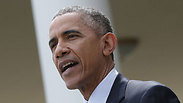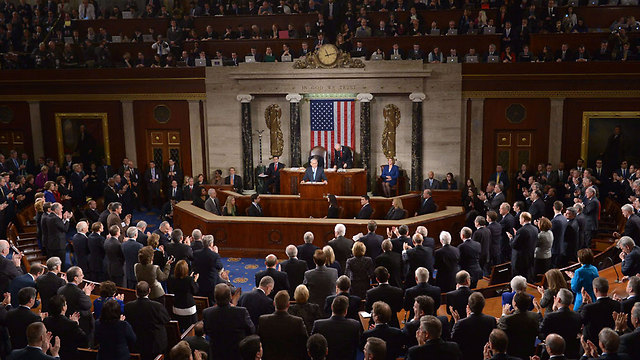
Obama. A strategic duel vis-a-vis Netanyahu
צילום: AFP
Obama's Congress trick
Analysis: Those relying on Iran deal being thwarted by US Congress are in for a disappointment, unless final agreement is much worse than draft proposed in Lausanne – and in such a case, American president himself may be unwilling to approve it.
Many in Israel and in the Gulf states are pinning their hopes on the American Congress to curb the agreement taking shape between the world powers and Iran. But the Congress, as we know, has two houses: The Senate and the House of Representatives. What works in the Senate doesn’t necessarily work in the House of Representatives, and vice versa.

The two Houses did approve recently, with a huge majority, a bill obligating US President Barack Obama to let the Congress to review and approve the final draft of an agreement with Iran. That's good.
But while Prime Minister Benjamin Netanyahu has been firmly working towards that, the American president has since taken an important step forward as far as he is concerned in the strategic duel vis-à-vis the prime minister, preparing the House of Representatives to block any decision raised in Congress to reject a presidential veto, if there is one.
Complicated? Let's try to simplify it. The House of Representatives has 435 members. Thwarting a presidential veto on a Congress decision not to approve an agreement with Iran requires a majority of two-thirds of the House of Representatives members and two-thirds of the Senate, which has 100 members. A letter sent to Obama recently by 150 House of Representatives members, more than one-third of the House of Representatives members, supports the president's policy and the continuation of negotiations with Iran.

The importance of Netanyahu's move in the Congress and the moves of senior senators is in setting a higher bar for the president and secretary of state in regards to a nuclear agreement with Iran (Photo: AFP) (צילום: AFP)
So it's reasonable to assume that the president, who already has a lot more than one-third of the House of Representatives members who support his stand on the Iranian issue, has pretty much guaranteed his immunity against thwarting a presidential veto at the Congress, if the president indeed decides to veto a decision not to approve the agreement.
This move has caused the House of Representatives' speaker, John Boehner, to admit that he does not have the required votes to block and thwart a presidential veto at the House. In the Senate as well, by the way, the president only needs 34 of 100 senators to support the agreement.
So what do we have? The importance of Netanyahu's move in the Congress and the moves of senior senators, like the leaders of the Committee on Foreign Relations – Senators Bob Corker, Bob Menendez, Ben Cardin and others – is in setting a higher bar, as far as they are concerned, for the president and secretary of state in regards to a nuclear agreement with Iran. In other words, placing a stop sign concerning American concessions in the talks taking place in Vienna. The president is aware of the possibility that the agreement will not be approved by the Congress and will try to avoid it.
But if a deal signed between the world powers and Iran largely diverts from the agreement the world powers and Tehran reached in Lausanne, and is perceived as extremely bad in terms of the American security interest, it may not be approved by the Congress and may even lead to the rejection of a presidential veto, if such a veto is imposed. However, the final agreement has to be a much worse agreement than the one that has been published and is taking shape, as the letter of the 150 House of Representatives members was written after the publication of the draft agreement reached in Lausanne.
President Obama doesn’t usually impose a veto. He is the president with the fewest presidential vetoes in American history. He simply doesn’t take the chance of losing to the Congress and doesn’t like it. Therefore, he will be careful not to sign a bad agreement in the eyes of the Congress' Democratic members.
But if anyone is hoping that the agreement will be thwarted by the Congress, they are in for a disappointment, unless the final agreement is much worse than the draft proposed in Lausanne – and in such a case, the American president himself may be unwilling to approve it.
Prof. Alex Mintz is the chair of the Herzliya Conference series and director of the Institute for Policy and Strategy (IPS) at the Interdisciplinary Center Herzliya.










